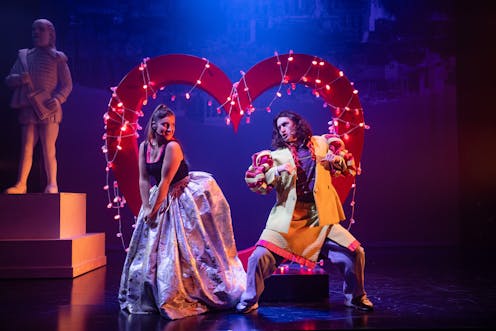Bell Shakespeare's The Lovers is a sugar-fuelled, ironic adaptation of A Midsummer Night's Dream for Gen Z
- Written by Gabriella Edelstein, Lecturer in English, University of Newcastle

Review: The Lovers, directed by Shaun Rennie.
What was the first Shakespeare play you were exposed to as a child? It’s very likely that it was A Midsummer Night’s Dream. Of all the plays in Shakespeare’s canon, A Midsummer Night’s Dream is the most associated with children: it’s a play of fairies, transformation, and the chaotic world of imagination.
But Dream is not just a sweet and innocent opportunity for children to play dress-ups. Writhing underneath the surface of this play is a dark, erotic story about perverted desire. After all, we wouldn’t want kids thinking too deeply about fairy queen Titania’s liaison with a donkey.
Bell Shakespeare’s new musical The Lovers, written and composed by Laura Murphy and directed by Shaun Rennie, may be an adaptation targeted towards young people, but it’s certainly not A Midsummer Night’s Dream for children.
This cheeky, charming, and joyful pop musical is propelled by the dynamic energy of puppy love. Cutting out the rude mechanicals, and the plot of Titania and fairy king Oberon’s fight over the changeling boy, The Lovers focuses on Hermia, Helena, Demetrius, and Lysander’s (Brittanie Shipway, Natalie Abbott, Blake Appelqvist, Jerrod Smith) frolicking and fighting in the woods.
Oberon and Puck (Stellar Perry, Monique Sallé) are the orchestrators of this madness, drugging the lovers with a narcotic called “Euphoria” in the hopes of getting the kids back to the good-old-days when you fell in love without a smartphone.
The Lovers is a risqué musical. Murphy’s adaptation of Dream is attentive to teenagers’ rowdy sexual desire, which the cast performs with electric vivacity. The talented actors and singers make it seem like there’s nothing more fun than twerking in a farthingale.
The Lovers focuses on and modernises Shakespeare’s interest in young love, studiously omitting the dark and dangerous elements that make Dream a play for adults. Instead, this is Dream for Gen Z: a sugar-fuelled, ironic romp that wishes to undermine the Shakespearean marriage plot.
‘Full of hateful fantasies’
Dream as Shakespeare-for-children is a legacy of the 19th century. In 1807, sibling writers Mary and Charles Lamb published Tales from Shakespeare, subplot and sexual-reference-free prose retellings of the plays that were meant as gentle introductions to Shakespeare’s canon.
To appeal to children, the Lambs emphasised the fairies’ role in the story. Later, during the Victorian era, spellbinding spectacles of dancing and singing fairy-children in a stage forest were the main feature of productions, cementing Dream as a children’s play in the dramatic imaginary.
But by the mid-20th century, saccharine productions of Dream had been rejected by the theatre establishment. Directors, like the late Peter Brook, were influenced by Polish scholar Jan Scott, who argued that Dream is not a fantasy but a psycho-sexual nightmare.
There are many disturbing elements to Shakespeare’s original play. Hippolyta, the Amazon queen, is captured and forced into marriage with Athens’ king, Theseus. Egeus, Hermia’s father, asks Theseus to kill his daughter if she refuses to marry his preferred groom, Demetrius. Oberon and Puck conspire to trick Titania into making love to the half-man-half donkey Bottom so that they can abduct the little boy she vowed to protect. And Demetrius threatens to rape Helena in the woods if she doesn’t let him be.
‘Jack shall have Jill; / Nought shall go ill’
The Lovers scraps most of the dark elements of Shakespeare’s original. After all, it would ruin the fun. The musical does retain Demetrius’ threat, but it comes across as the young man’s disclosure that he’s secretly in love with Helena after all, not as the troubling warning that it is in the original.
The Lovers is Dream not for children, nor for adults any older than late-Millennial. It’s pitched squarely at Zoomers with its pop-music references and playful disruptions of sexual expectations.
It doesn’t want to show young audiences how weird and dark Shakespeare is, nor does it wish to uphold ideals of romantic love that Dream has already been used to promulgate.
In adapting A Midsummer Night’s Dream, The Lovers wants to unsettle young audience’s assumptions of what makes a “happy” ending: marriage at the end of a comedy. The characters sing, “Maybe the happy ending we fixate on needs a little adaptation”.
As The Lovers rightly suggests, it’s a little creepy that Demetrius marries Helena at the end of Dream, considering that the spell of Oberon’s magic flower is never broken.
Rather than ending with happily ever after, the musical has a different message: “You’ve already found the one”. Turns out, your own true love is yourself – “you are enough”, the characters sing – suggesting that young people can’t make happy partnerships when they are unhappy within themselves.
The musical reiterates the “If you don’t love yourself how can you love anybody else” philosophy, popularised by entertainment figures such as RuPaul.
But this concept implies people still doing psychological work cannot love healthily and should not embark on relationships. Although seemingly about empowerment, this message promotes unhealthy expectations of what is a whole or lovable person.
The Lovers opens and closes with a tremendously fun number, Love, Pop, and Shakespeare. The characters sing to the audience, “it’s what you all came here for”. If that is why you are seeing The Lovers, you’re in for a good time. But maybe don’t think too hard about the Shakespeare.
Bell Shakespeare’s The Lovers plays at the Sydney Opera House until November 20.
Authors: Gabriella Edelstein, Lecturer in English, University of Newcastle




